September 5th, 2009 by Marc AuMarc
They were in Bermuda when we last went on expedition there and they recently arrived in Roatan, Honduras. They’re beautiful, they have poisonous spines and they eat everything on the reef. With what seems to be no natural predators, the Lionfish (Pterois volitans) is an Indo-pacific species that is taking the Caribbean by storm.
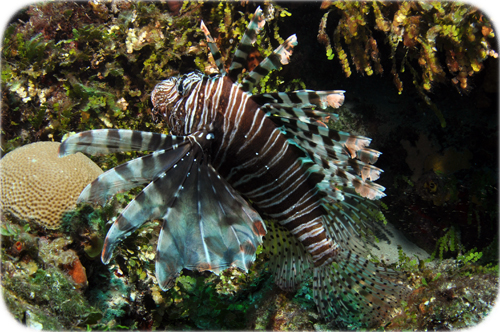
Since their arrival in the Bahamas five or more years ago, they have become extremely common. They reproduce quickly and have no known local predators. We have seen them on every dive and snorkel we have taken since arriving here.
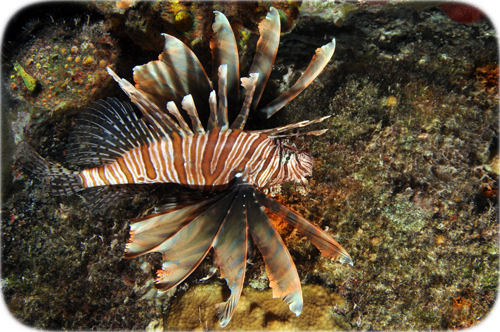
Their insouciance and feathery fins make them an ideal photo-op, but behind each photo is a trail of death and destruction. While we were here a group from the National Aquarium in Washington, DC and reef.org was hunting Lionfish with nets and spears in an attempt to stem their spread. A typical day’s catch was 50-70 fish or more. Some dives were aborted when the local sharks became interested in the activity. Unfortunately, the sharks seemed entirely uninterested in consuming the Lionfish.
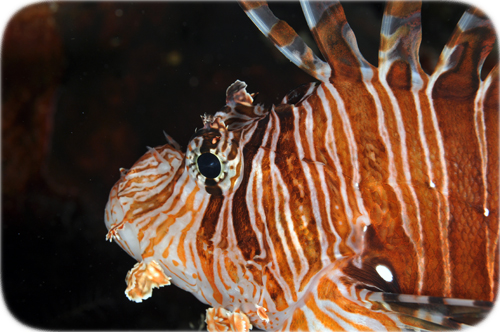
It’s hard to imagine these fish not remaining endemic in the Caribbean. One last hope may be to promote Lionfish as a tasty meal, which apparently they are, but even then the odds seem to be against it. In Honduras, where they have just arrived, efforts are underway to eradicate them before they become established. Hopefully they have some success.
Posted in On Expedition
Comment on this post.
September 4th, 2009 by Marc AuMarc
Check out our daily updates while on expedition in Nassau, Bahamas! Fish, reefs, sharks and more!!!
Posted in News
Comment on this post.
September 4th, 2009 by Marc AuMarc
Les Fruits de Mer completed five dives today, including a shark feeding and a night dive at the spectacular James Bond wrecks.
After a couple of morning dives, we undertook the first afternoon shark dive on the reef. After seeing a number of sharks who were excited about the upcoming feeding, we took a quick trip out to the reef wall and spotted this turtle.
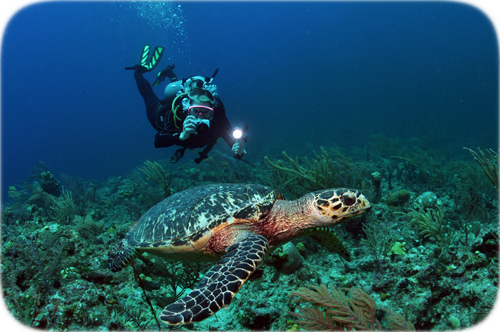
The shark feeding was quite amazing. Dozens of reef sharks congregated around the bait box and swam within inches of us…and even closer.
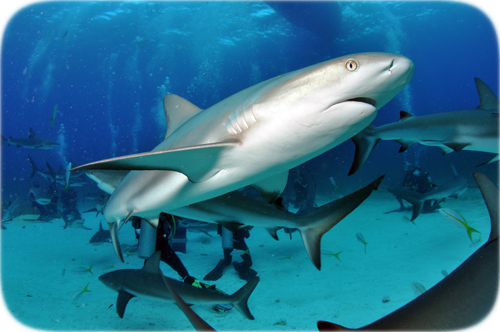
It was wonderful to dive with so many sharks, particularly as they are quickly becoming endangered around the world, with hundreds of millions killed each year, primarily for their fins.
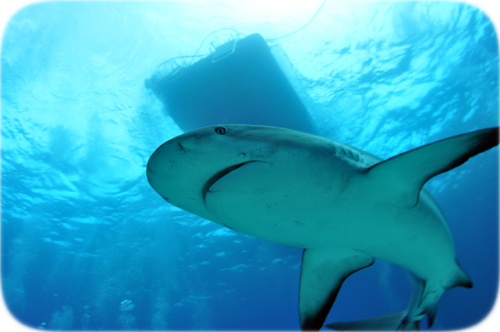
We finished the day with a night dive on the James Bond wrecks, so named because they appeared in the films Never Say Never Again and Thunderball. They were full of basket stars, one of my favorite sea creatures.
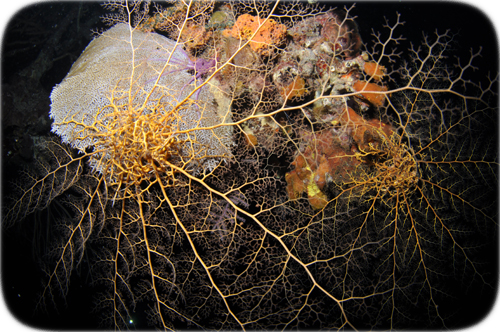
Posted in On Expedition
Comment on this post.
September 3rd, 2009 by Marc AuMarc
This afternoon we arrived in the Bahamas for the first time ever. Our lodgings, at Orange Hill are near the Lyndon Pindling International Airport. After checking in we undertook an E.S.S. mission off the beach in front of the hotel and found a wide variety of marine life.
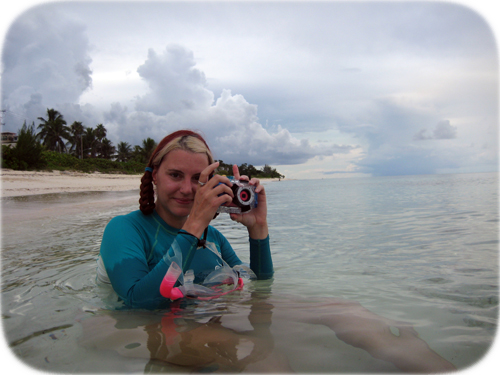
Unfortunately, we encountered four Lionfish, an invasive species from the Pacific Ocean. Although they are ravenous hunters with few local predators (especially with the overfishing of large fish like Grouper). On the other hand, they area a beautiful fish that is unafraid of humans.
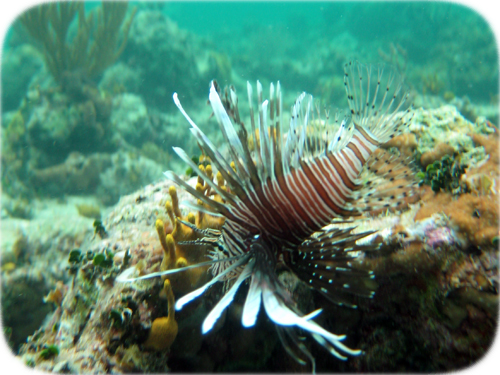
Marc AuMarc, with his keen eye for sea life (and creatures in general) also spotted a Stonefish, a poisonous fish that lives on the sea floor, carefully camouflaged.

In the extreme shallows, we found many Mermaid’s Cups, an adorable species of green algae.
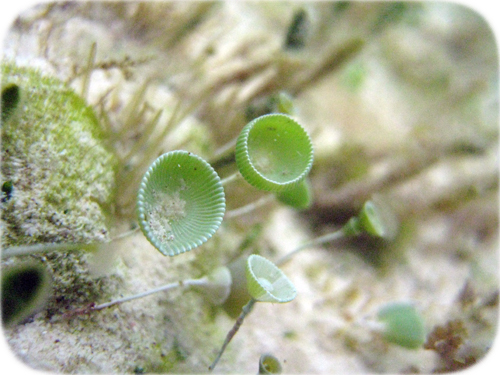
After a wonderful snorkel, we enjoyed a beer back at the hotel with local photographer Ben Jamieson, and headed to Provence for a romantic dinner for two.
Posted in On Expedition
Comment on this post.
September 1st, 2009 by Marc AuMarc
How awesome is BBC Earth News? Today they have a feature on deep water jellyfish of the arctic. Pretty awesome, and the photos are amazing. From the captions it looks like they were down up to 2,400 meters in icy water.
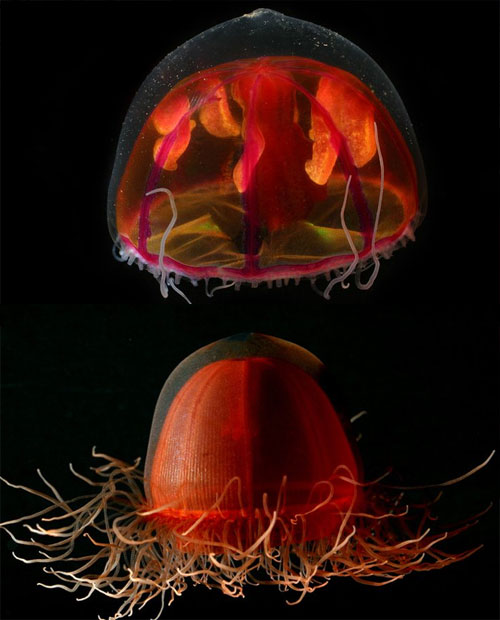
Posted in Things from the Internet, Things Involving Submarines
Comment on this post.












